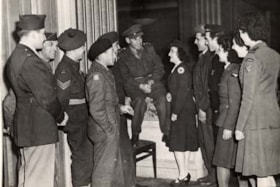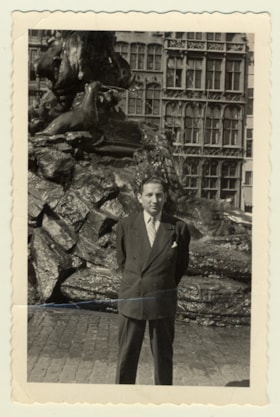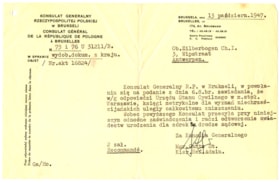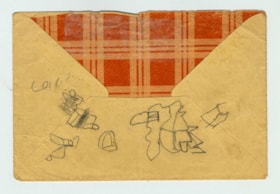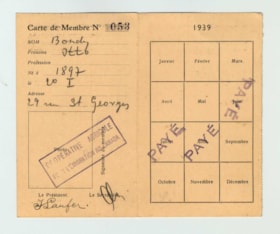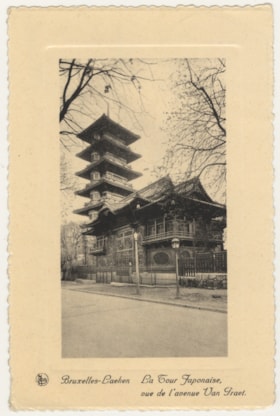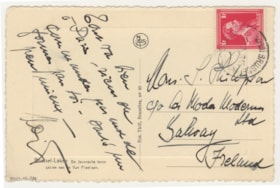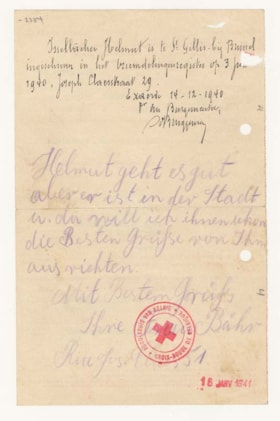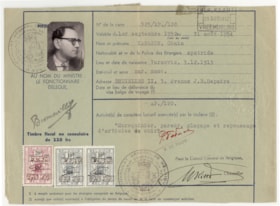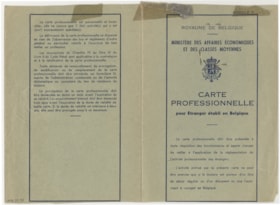Narrow Results By
Passover Seder in Brussels
https://www.cjhn.ca/link/cjhn44146
- Collection
- CONGREGATION SHAAR HASHOMAYIM MUSEUM AND ARCHIVES
- Description Level
- Item
- Material Type
- graphic material
- Physical Description
- Photograph : b&w ; Ht:11.3 cm x W:16.4 cm
- Fonds No.
- SH-01; 253
- Date
- [ca. 1945]
- Description Level
- Item
- Material Type
- graphic material
- Physical Description
- Photograph : b&w ; Ht:11.3 cm x W:16.4 cm
- Date
- [ca. 1945]
- Fonds No.
- SH-01
- Item No.
- 253
- Creator
- Photographer: Canadian Military
- Physical Condition
- Good
- Notes
- Seder in Brussels. Right front are two CWACS: Private Eva Keller and Corporal M. Freedman.
- Places
- Brussels, Belgium, Belgium
- Archival / Genealogical
- Archival Descriptions
- Repository
- Congregation Shaar Hashomayim Museum and Archives
Images
Alice Shenkier and her Brother's Wife
https://www.cjhn.ca/link/cjhn45639
- Collection
- Montreal Holocaust Museum
- Description Level
- Item
- Material Type
- graphic material
- Physical Description
- Photograph : Paper ; Ht: 5,4 cm x W: 7,8 cm
- Date
- 1937
- Collection
- Montreal Holocaust Museum
- Description Level
- Item
- Material Type
- graphic material
- Physical Description
- Photograph : Paper ; Ht: 5,4 cm x W: 7,8 cm
- Other Title Information
- Documentary Artifact
- Date
- 1937
- Physical Condition
- Good
- Notes
- B&w photograph with a white border. An outdoor scene, in which two women are sitting on a bench, on the deck of a ship. The woman on the left is wearing a dark coloured dress with a floral blouse peeking out at the collar and a dark coloured coat draped over her shoulders. The woman on the right is wearing a long dark coloured coat with a light coloured blouse peeking out at the collar. From left to right, Henia Eckstein and Alice Eckstein are shown.
- Accession No.
- 2000.84.12
- Name Access
- Shenkier, Maurice
- Places
- Brussels, Belgium, Europe
- Archival / Genealogical
- Archival Descriptions
- Repository
- Montreal Holocaust Museum
Images
Herman Shenkier and his Girlfriend
https://www.cjhn.ca/link/cjhn45642
- Collection
- Montreal Holocaust Museum
- Description Level
- Item
- Material Type
- graphic material
- Physical Description
- Photograph : Paper ; Ht: 14,7 cm x W: 9,8 cm
- Date
- 1928
- Collection
- Montreal Holocaust Museum
- Description Level
- Item
- Material Type
- graphic material
- Physical Description
- Photograph : Paper ; Ht: 14,7 cm x W: 9,8 cm
- Other Title Information
- Documentary Artifact
- Date
- 1928
- Physical Condition
- Good
- Notes
- B&w photograph with a white border. A portrait of a young man and woman in front of a backdrop. The woman is wearing a short dark coloured coat with a dark coloured skirt and boots. In her left hand, she is holding light coloured gloves and a small bag. Atop her head is a large-brimmed feather hat. The man is wearing a long light coloured trench coat with dark coloured pants and boots. His left hand is covered by a dark glove and he is holding onto the other glove. He is wearing a light coloured fedora hat. Those depicted in the photograph are Herman Shenkier and his girlfriend.
- Accession No.
- 2000.84.15
- Name Access
- Shenkier, Maurice
- Places
- Brussels, Belgium, Europe
- Archival / Genealogical
- Archival Descriptions
- Repository
- Montreal Holocaust Museum
Images
Sam Shenkier and Business Partners
https://www.cjhn.ca/link/cjhn45644
- Collection
- Montreal Holocaust Museum
- Description Level
- Item
- Material Type
- graphic material
- Physical Description
- Photograph : Paper ; Ht: 14,8 cm x W: 9,6 cm
- Date
- 1927
- Collection
- Montreal Holocaust Museum
- Description Level
- Item
- Material Type
- graphic material
- Physical Description
- Photograph : Paper ; Ht: 14,8 cm x W: 9,6 cm
- Other Title Information
- Documentary Artifact
- Date
- 1927
- Physical Condition
- Good
- Language
- English
- Notes
- b&w photograph with white border. An outdoor scene, in which three men wearing dress clothes are feeding pidgeons in the middle of a street. The street behind the men is crowded and the building in the background is a shoe store. From left to right, Sam Shenkier and his two business partners are shown. Narrative: Sam Shenkier was the donor's father. He owned a furniture store in Brussels, Belgium called Meubelmagazijn.
- Accession No.
- 2000.84.17
- Name Access
- Shenkier, Maurice
- Places
- Brussels, Belgium, Europe
- Archival / Genealogical
- Archival Descriptions
- Repository
- Montreal Holocaust Museum
Images
Sam Shenkier and Business Partner
https://www.cjhn.ca/link/cjhn45645
- Collection
- Montreal Holocaust Museum
- Description Level
- Item
- Material Type
- graphic material
- Physical Description
- Photograph : Paper ; Ht: 15,9 cm x W: 11 cm
- Date
- 1929
- Collection
- Montreal Holocaust Museum
- Description Level
- Item
- Material Type
- graphic material
- Physical Description
- Photograph : Paper ; Ht: 15,9 cm x W: 11 cm
- Other Title Information
- Documentary Artifact
- Date
- 1929
- Physical Condition
- Good
- Language
- English
- Notes
- b&w photograph with a white border only along the length. An outdoor portait of two men wearing dress clothes in the middle of a street, holding their briefcases. In the background, there is a large building with an illegible sign. Those depicted in the photograph are Sam Shenkier to the right and his business partner to the left. Narrative: Sam Shenkier was the donor's father. He owned a furniture store in Brussels, Belgium called Meubelmagazijn.
- Accession No.
- 2000.84.18
- Name Access
- Shenkier, Maurice
- Places
- Brussels, Belgium, Europe
- Archival / Genealogical
- Archival Descriptions
- Repository
- Montreal Holocaust Museum
Images
Sam Shenkier at the Grand Place
https://www.cjhn.ca/link/cjhn45659
- Collection
- Montreal Holocaust Museum
- Description Level
- Item
- Material Type
- graphic material
- Physical Description
- Photograph : Paper ; Ht: 10 cm x W: 7 cm
- Date
- 1938
- Collection
- Montreal Holocaust Museum
- Description Level
- Item
- Material Type
- graphic material
- Physical Description
- Photograph : Paper ; Ht: 10 cm x W: 7 cm
- Other Title Information
- Documentary Artifact
- Date
- 1938
- Physical Condition
- Good
- Notes
- B&w photograph with a white border. An outdoor portrait of a man standing in front of a fountain at the Grand Place. The man is wearing a dark coloured suit and a white collared shirt with a striped tie. The man depicted is Sam Shenkier.
- Accession No.
- 2000.84.33
- Name Access
- Shenkier, Maurice
- Places
- Brussels, Belgium, Europe
- Archival / Genealogical
- Archival Descriptions
- Repository
- Montreal Holocaust Museum
Images
Maurice Shenkier with cousin Marcel Braitstein and grandmother Nicha Eckstein
https://www.cjhn.ca/link/cjhn45680
- Collection
- Montreal Holocaust Museum
- Description Level
- Item
- Material Type
- graphic material
- Physical Description
- Photograph : Paper ; Ht: 8,9 cm x W: 11,8 cm
- Date
- 1948
- Collection
- Montreal Holocaust Museum
- Description Level
- Item
- Material Type
- graphic material
- Physical Description
- Photograph : Paper ; Ht: 8,9 cm x W: 11,8 cm
- Other Title Information
- Documentary Artifact
- Date
- 1948
- Physical Condition
- Good
- Notes
- B&w photograph with a white border. An outdoor portrait of two young boys and an elderly woman, standing outside a house. From left to right, Marcel Braitstein, Nicha Eckstein and cousin Edgar are shown.
- Accession No.
- 2000.84.54
- Name Access
- Shenkier, Maurice
- Places
- Brussels, Belgium, Europe
- Archival / Genealogical
- Archival Descriptions
- Repository
- Montreal Holocaust Museum
Images
Buchenwald: Les Horreurs des Camps de Torture Nazis: Reportages Photographiques
https://www.cjhn.ca/link/cjhn47579
- Collection
- Montreal Holocaust Museum
- Description Level
- Item
- Material Type
- textual record
- Physical Description
- Booklet : printed, bound, photography : sepia, beige, black ; Ht: 24 cm x W: 15,4 cm
- Date
- May 1945
- Collection
- Montreal Holocaust Museum
- Description Level
- Item
- Material Type
- textual record
- Physical Description
- Booklet : printed, bound, photography : sepia, beige, black ; Ht: 24 cm x W: 15,4 cm
- Other Title Information
- Documentary Artifact
- Date
- May 1945
- Physical Condition
- Good
- Language
- French
- Notes
- 15 pages. soft cover, paper bound and stapled. Beige cover with a sepia photo of 2 emaciated men; titles in beige at the top and bottom. Publishing information is listed on the back cover. Back cover is a sepia photo of a nurse feeding an emaciated prisoner with captions at the bottom in black. Interior pages are beige with black text and sepia photos.
- Accession No.
- 2011X.335.01
- Name Access
- Tiger, Dolly
- Places
- Brussels, Belgium, Europe
- Archival / Genealogical
- Archival Descriptions
- Repository
- Montreal Holocaust Museum
Images
Letter
https://www.cjhn.ca/link/cjhn48277
- Collection
- Montreal Holocaust Museum
- Description Level
- Item
- Material Type
- textual record
- Physical Description
- Letter : paper : beige ; Ht: 13,6 cm x W: 21,5 cm
- Date
- October 13, 1947
- Collection
- Montreal Holocaust Museum
- Description Level
- Item
- Material Type
- textual record
- Physical Description
- Letter : paper : beige ; Ht: 13,6 cm x W: 21,5 cm
- Other Title Information
- Documentary Artifact
- Date
- October 13, 1947
- Physical Condition
- Good
- Language
- French
- Polish
- Notes
- Letter adress to Chana Zilberbogen (Anna, born Wartens) about relevant certificates and birth certificates of her daughters Celinka (Cécile) and Elzbieta (Elizabeth) Zilberbogen. Narrative: The Zilberbogen were a Jewish family originally from Warsaw (Poland). Mother Chana and daughters Elzbieta (born 1933) and Celinka (born 1937) moved to Belgium in 1939. The father, Szygmundt, an engineer, stayed in Poland. During the Second World War, the mother and daughters were first sent to a transit camp in the South of France before being released. Chana was then hospitalized and spent the war hidden in a Sanatorium in Mazamet. Elzbieta and Celinka were hidden in various locations in the South of France, including a farm and different children's homes run by OSE. Szygmundt was killed in Poland. Chana and her daughters went back to live in Belgium after Liberation until immigrating to Canada in 1951.
- Accession No.
- 2012.15.64
- Name Access
- Peltier, Cécile
- Places
- Brussels, Belgium, Europe
- Archival / Genealogical
- Archival Descriptions
- Repository
- Montreal Holocaust Museum
Images
Envelope
https://www.cjhn.ca/link/cjhn50161
- Collection
- Montreal Holocaust Museum
- Description Level
- Item
- Material Type
- textual record
- Physical Description
- Envelope : Paper : Beige, pink, blue ; Ht: 3,75 in. x W: 5,75 in.
- Date
- September 22, 1943
- Collection
- Montreal Holocaust Museum
- Description Level
- Item
- Material Type
- textual record
- Physical Description
- Envelope : Paper : Beige, pink, blue ; Ht: 3,75 in. x W: 5,75 in.
- Other Title Information
- Documentary Artifact
- Date
- September 22, 1943
- Physical Condition
- Good
- Language
- French
- Notes
- The envelope is cream coloured with a pink and cream check design inside. Circular stamp in upper right corner, on top of a square postage stamp with a man facing right on it. Postmark “Hassel 22.9.43”. Narrative: Envelope sent by Otto and Margaraethe Bondy (nee Fischer) as they were being deported from Brussels. The envelope was addressed to their neighbours in Brussels and later given to their son. There is a postage stamp and the postmark “Hassel 22 9 43”. The Bondy were deported on transport XXIIA on September 20, 1943 which arrived in Auschwitz on 1943-09-22. They were both killed on Auscwhitz. Their children survived in hiding.
- Accession No.
- 1990.96.141
- Name Access
- Absil, Walter
- Places
- Brussels, Belgium, Europe
- Archival / Genealogical
- Archival Descriptions
- Repository
- Montreal Holocaust Museum
Images
Identification card
https://www.cjhn.ca/link/cjhn50269
- Collection
- Montreal Holocaust Museum
- Description Level
- Item
- Material Type
- textual record
- Physical Description
- Identification card : Paper : Beige, Red, Black, White, Blue
- Date
- November 24, 1939
- Collection
- Montreal Holocaust Museum
- Description Level
- Item
- Material Type
- textual record
- Physical Description
- Identification card : Paper : Beige, Red, Black, White, Blue
- Other Title Information
- Documentary Artifact
- Date
- November 24, 1939
- Physical Condition
- Poor
- Language
- French
- Dutch
- Notes
- 1 page, double sided, folded into 3 vertical panels. On the interior is a photograph of Friedrich Rübler, the donor's brother in-law. There is also a circular stamp with the Belgian Coat of Arms in the centre. This identification card was delivered to foreigners in Belgium. It is stamped in red "JUIF-JOOD", identifying Friedrich as Jewish.
- Accession No.
- 1990.113.01
- Name Access
- Absil, Walter
- Places
- Brussels, Belgium, Europe
- Archival / Genealogical
- Archival Descriptions
- Repository
- Montreal Holocaust Museum
Images
Membership card
https://www.cjhn.ca/link/cjhn50317
- Collection
- Montreal Holocaust Museum
- Description Level
- Item
- Material Type
- textual record
- Physical Description
- Membership card : Paper : Ink : Black, Biege, Purple ; Ht: 12,1 cm x W: 7,1 cm
- Date
- 1939-1940
- Collection
- Montreal Holocaust Museum
- Description Level
- Item
- Material Type
- textual record
- Physical Description
- Membership card : Paper : Ink : Black, Biege, Purple ; Ht: 12,1 cm x W: 7,1 cm
- Other Title Information
- Documentary Artifact
- Date
- 1939-1940
- Physical Condition
- Good
- Language
- French
- Yiddish
- Notes
- 1 vertical fold. The inside, and the back have a chart with twelve boxes, one for each month of the year, there are three stamps on the chart on the inside. There is also an additional rectangular stamp on the inside. Membership card issued to Otto Bondy from the agricultural cooperative/society for immigration to Canada. Card was valid from 1939 and 1940. It was paid up until August, 1939. Narrative: the card belonged to donor's father. Donor believes that his father tried to get visas in different countries, including Canada. Otto Bondy was born in Wien, Austria in 1897. He was a leather manufacturer and married to Margarethe nee Fischer. the Bondy family left Austria the day after the annexion by the German Reich and found refuge in Belgium. During the war, Otto and Margarethe were sent to Malines transit camp and deported with Transport XXII A to Auschwitz Birkenau, Extermination Camp, Poland on 1943-09-20. They were both killed in Auschwitz. thei two children survived in hiding.
- Accession No.
- 1990.96.15
- Name Access
- Absil, Walter
- Places
- Brussels, Belgium, Europe
- Archival / Genealogical
- Archival Descriptions
- Repository
- Montreal Holocaust Museum
Images
Letter
https://www.cjhn.ca/link/cjhn50323
- Collection
- Montreal Holocaust Museum
- Description Level
- Item
- Material Type
- textual record
- Physical Description
- Letter : Paper : Pencil : Yellow, Blue ; Ht: 6,8 in. x W: 5,25 in.
- Date
- September 22, 1943
- Collection
- Montreal Holocaust Museum
- Description Level
- Item
- Material Type
- textual record
- Physical Description
- Letter : Paper : Pencil : Yellow, Blue ; Ht: 6,8 in. x W: 5,25 in.
- Other Title Information
- Documentary Artifact
- Date
- September 22, 1943
- Physical Condition
- Excellent
- Language
- German
- Notes
- 1 page, written on both sides. Narrative: Letter was written by Margarethe (Gretl) and Otto Bondy during their deportation from Malines (Mecheln) transit camp in Belgium to Holland. The letter is addressed to Margarethe's mother and mentions her son, Walter referring to him as "W". Otto and Margharethe Bondy were later deported to Auschwitz-Birkenau where they were killed.
- Accession No.
- 1990.96.142
- Name Access
- Absil, Walter
- Places
- Brussels, Belgium, Europe
- Archival / Genealogical
- Archival Descriptions
- Repository
- Montreal Holocaust Museum
Images
Postcard
https://www.cjhn.ca/link/cjhn50529
- Collection
- Montreal Holocaust Museum
- Description Level
- Item
- Material Type
- textual record
- Physical Description
- Postcard : Paper : Beige ; Ht: 14 cm x W: 9,1 cm
- Collection
- Montreal Holocaust Museum
- Description Level
- Item
- Material Type
- textual record
- Physical Description
- Postcard : Paper : Beige ; Ht: 14 cm x W: 9,1 cm
- Other Title Information
- Documentary Artifact
- Notes
- b&w photograph of Japanese tower in Brussels on recto. Handwritten message in blue ink on verso. Narrative: In the 1920’s Serge and Sophie Philipson (nee Orbach) left Berlin for Paris due to rising antisemitism. On July 15, 1930 their daughter Rachel was born. Serge, Sophie and Rachel were Polish citizen, they never got either the German or the French citizenship. In Paris, Serge worked for Les Modes Modernes, the hat factory of his brother-in-law, Henri. When an opportunity to expand the business in Ireland arose, Serge moved to Galway. The new factory opened in July 1938. In August 1939, Sophie, Rachel, and 4 other family members (Rachel’s cousin Stéphane, his maternal grandmother Néné, Serge’s sister Esther and Serge’s sister-in-law Choura) left for Cabourg, in Normandy. After the winter 1939-1940 it became difficult to communicate with Ireland but Rachel and Sophie could still send and receive letter from Serge. At the end of winter 1940, the group moved to Néris and in July 1940, after the occupation of France by Germany, they settled in the zone libre in the village of Cauterets, on the border with Spain. They were reunited with Robert, Serge’s brother. In August 1942, 4 family members (Sophie’s sister Ella and her husband Ernest, their daughter Ruth, Serge’s siblings Robert and Esther) were arrested by local police and deported. They were not seen again. At the beginning of 1943, Sophie, her mother Augusta and Rachel moved to Maubourguet. In April 1943, they moved to Cannes in Hotel Victoria with Henri, Stéphane and Néné. Henri, Sophie and Augusta went into hiding together while cousins Stéphane and Rachel were taken care of by Néné and returned to Maubourguet. In January 1944, Henri, Sophie and Augusta were denounced and arrested. They were transferred to Marseille before being sent by train to Drancy transit camp from where they were deported. It is believed they were killed in a Polish killing centre. In 1944, Rachel moved from one place to another – under a non-Jewish identity - and continued to correspond with her father. In June 1945, she reunited with her father Ireland. They had not seen each other for 6 years. In 1951, Rachel got married. In 1954, she immigrated to Montreal.
- Accession No.
- 2002.08.374
- Name Access
- Levy, Rachel
- Places
- Brussels, Belgium, Europe
- Archival / Genealogical
- Archival Descriptions
- Repository
- Montreal Holocaust Museum
Images
Walter Bondy and sister Liesl in front of an antisemitic poster “Le complot Juif”
https://www.cjhn.ca/link/cjhn51324
- Collection
- Montreal Holocaust Museum
- Description Level
- Item
- Material Type
- graphic material
- Physical Description
- Photograph : Paper ; Ht: 15,3 cm x W: 11,5 cm
- Date
- 1941
- Collection
- Montreal Holocaust Museum
- Description Level
- Item
- Material Type
- graphic material
- Physical Description
- Photograph : Paper ; Ht: 15,3 cm x W: 11,5 cm
- Other Title Information
- Documentary Artifact
- Date
- 1941
- Physical Condition
- Excellent
- Notes
- b&w, white border. Brother and sister Walter and Liesl Bondy are standing in front of a wall covered in antisemitic posters reading "Jewish conspiracy" (in French: Le complot Juif and in Flemish: Juden Komplott). A white V letter is also painted on the wall next to where Lisel stands. The V for victory was a symbol of resistance to the Nazi regime. Narrative: Walter and his sister had fake Belgian identity cards and managed to survive the war in hiding. Both their parents as well as their maternal grandmother were deported from Kazern Dossin in Malines to Auschwitz concentration camp and killed there. On January 14, 1941, Victor de Laveleye, former Belgian Minister of Justice and director of the Belgian French-speaking broadcasts on the BBC (1940–1944), suggested in a broadcast that Belgians use a V for victoire as a rallying emblem during World War II. By July 1941, the emblematic use of the letter V had spread through occupied Europe.
- Accession No.
- 1990.96.12
- Name Access
- Absil, Walter
- Places
- Brussels, Belgium, Europe
- Archival / Genealogical
- Archival Descriptions
- Repository
- Montreal Holocaust Museum
Images
Letter
https://www.cjhn.ca/link/cjhn59331
- Collection
- Montreal Holocaust Museum
- Description Level
- Item
- Material Type
- textual record
- Physical Description
- Letter : PaperPaper : Printed : Ink : Red, beige, black ; Ht: 21 cm x W: 14 cm
- Date
- November 07, 1940
- Collection
- Montreal Holocaust Museum
- Description Level
- Item
- Material Type
- textual record
- Physical Description
- Letter : PaperPaper : Printed : Ink : Red, beige, black ; Ht: 21 cm x W: 14 cm
- Other Title Information
- Documentary Artifact
- Date
- November 07, 1940
- Physical Condition
- Good
- Language
- French
- German
- Dutch
- Notes
- Beige paper form printed in red, double-sided, two holes punched in left, Belgian Red Cross letterhead. Form used to locate missing family members. While in Internment Camp L, Canada, Herbert Isselbächer tried to find his brother Helmut. Dutch text indicates that Helmut Isselbächer was registered as a foreigner in Saint-Gilles/Sint-Gilli (district of Brussels). Narrative: Isaac Herbert Isselbacher was born 1919-11-20 in Isselbach, Germany. His brother was Helmut Isselbacher, born 1921-12-20. Their father was Jacob Isselbacher, born 1883-08-05. They had an uncle and aunt, David and Betty Loewenstein, who lived in New York City with their two children. Isaac left Germany on 1939-07-29, hoping to join his relatives in NYC. He only had the time to get to London, England before the war broke out and started working in a factory. He was arrested at his workplace as an ‘enemy alien’ and sent to Canada for internment in 1940. Isaac was interned in Camp N in Sherbrooke, Quebec. He was drafted into the Works Program Division for woodworking and net-making. In 1940, he received a last letter from his parents which suggested their imminent deportation. After his release, circa November 1942, Isaac worked as a locksmith. He married Fanny Azeff on 1943-12-26 at the Bnai Jacob synagogue in Montreal. Fanny was born on 1921-12-23 in Canada, the daughter of Mr. and Mrs. Harry Azeff. Isaac was naturalized as a Canadian citizen on 1946-06-08. Fanny was naturalized on 1946-08-30 (she had lost her citizenship by marrying Isaac). Isaac’s brother, Helmut Isselbacher, was deported with Transport XXII A from Dossin casern in Mechelen (Malines), Belgium to Auschwitz Birkenau, Poland on 1943-09-20. Of the 2,450 people on the transport, 100 men were selected to work –including Helmut- and the remainder prisoners were gassed. Helmut was made to work as a welder, and was soon fitting new pipes for the gas chamber. He suffered a nervous breakdown as a result. As he was a valued welder, he was transferred to a labour camp in Upper Silesia (Poland) where he remained for two years. As the Russian army advanced, the 6,000 prisoners of this camp were evacuated by train. Helmut remembered being forced to march as the other prisoners died from exhaustion. When liberation was announced, the survivors travelled by ship from Luebeck, Germany, to Sweden with the aid of the Red Cross. After recovery, Helmut decided to remain in Sweden as a welder. Upon learning of his brother’s survival, Helmut travelled to New York in April 1946 to meet with him and their Loewenstein relatives. Afterwards, Helmut travelled to Canada bringing with him a washing machine and bras as late wedding presents for his brother and Fanny. By 1946-08-12, their parents were presumed dead and the two sons inquired into their estate. They received a deed for the land and travelled to the estate to discover that the current owner of their house was their old maid and her son had become the town mayor. Various disputes arose with the current ‘owners’ who believed the Isselbacher family dead. Isaac wished to discuss a settlement, but the mayor’s mother –not realizing Fanny understood German- called the neighbours at work to warn them not to come home as the Isselbacher sons had resurfaced. Payment for the land had reportedly been sent to Israel, though no documentation could be provided.
- Accession No.
- 1999.1.130
- Name Access
- Issley, Jason
- Places
- Brussels, Belgium, Europe
- Archival / Genealogical
- Archival Descriptions
- Repository
- Montreal Holocaust Museum
Images
Letter
https://www.cjhn.ca/link/cjhn59496
- Collection
- Montreal Holocaust Museum
- Description Level
- Item
- Material Type
- textual record
- Physical Description
- Letter : Paper : Handwritten : Ink : Beige, blue ; Ht: 29 cm x W: 20 cm
- Date
- August 1939
- Collection
- Montreal Holocaust Museum
- Description Level
- Item
- Material Type
- textual record
- Physical Description
- Letter : Paper : Handwritten : Ink : Beige, blue ; Ht: 29 cm x W: 20 cm
- Other Title Information
- Documentary Artifact
- Date
- August 1939
- Physical Condition
- Good
- Language
- German
- Notes
- One page, double-sided, graph paper, notes written vertically and addition made in pencil on back. Letter from Helmut Isselbacher in Brussels to his brother Isaac Isselbacher in England. Helmut requests any type of fabrics be sent to him -old shirts and handkerchiefs. Narrative: Isaac Herbert Isselbacher was born 1919-11-20 in Isselbach, Germany. His brother was Helmut Isselbacher, born 1921-12-20. Their father was Jacob Isselbacher, born 1883-08-05. They had an uncle and aunt, David and Betty Loewenstein, who lived in New York City with their two children. Isaac left Germany on 1939-07-29, hoping to join his relatives in NYC. He only had the time to get to London, England before the war broke out and started working in a factory. He was arrested at his workplace as an ‘enemy alien’ and sent to Canada for internment in 1940. Isaac was interned in Camp N in Sherbrooke, Quebec. He was drafted into the Works Program Division for woodworking and net-making. In 1940, he received a last letter from his parents which suggested their imminent deportation. After his release, circa November 1942, Isaac worked as a locksmith. He married Fanny Azeff on 1943-12-26 at the Bnai Jacob synagogue in Montreal. Fanny was born on 1921-12-23 in Canada, the daughter of Mr. and Mrs. Harry Azeff. Isaac was naturalized as a Canadian citizen on 1946-06-08. Fanny was naturalized on 1946-08-30 (she had lost her citizenship by marrying Isaac). Isaac’s brother, Helmut Isselbacher, was deported with Transport XXII A from Dossin casern in Mechelen (Malines), Belgium to Auschwitz Birkenau, Poland on 1943-09-20. Of the 2,450 people on the transport, 100 men were selected to work –including Helmut- and the remainder prisoners were gassed. Helmut was made to work as a welder, and was soon fitting new pipes for the gas chamber. He suffered a nervous breakdown as a result. As he was a valued welder, he was transferred to a labour camp in Upper Silesia (Poland) where he remained for two years. As the Russian army advanced, the 6,000 prisoners of this camp were evacuated by train. Helmut remembered being forced to march as the other prisoners died from exhaustion. When liberation was announced, the survivors travelled by ship from Luebeck, Germany, to Sweden with the aid of the Red Cross. After recovery, Helmut decided to remain in Sweden as a welder. Upon learning of his brother’s survival, Helmut travelled to New York in April 1946 to meet with him and their Loewenstein relatives. Afterwards, Helmut travelled to Canada bringing with him a washing machine and bras as late wedding presents for his brother and Fanny. By 1946-08-12, their parents were presumed dead and the two sons inquired into their estate. They received a deed for the land and travelled to the estate to discover that the current owner of their house was their old maid and her son had become the town mayor. Various disputes arose with the current ‘owners’ who believed the Isselbacher family dead. Isaac wished to discuss a settlement, but the mayor’s mother –not realizing Fanny understood German- called the neighbours at work to warn them not to come home as the Isselbacher sons had resurfaced. Payment for the land had reportedly been sent to Israel, though no documentation could be provided.
- Accession No.
- 1999.1.118
- Name Access
- Issley, Jason
- Places
- Brussels, Belgium, Europe
- Archival / Genealogical
- Archival Descriptions
- Repository
- Montreal Holocaust Museum
Images
Work Permit
https://www.cjhn.ca/link/cjhn59576
- Collection
- Montreal Holocaust Museum
- Description Level
- Item
- Material Type
- textual record
- Physical Description
- Work Permit : Cardstock : Printed, typewritten : Ink : Navy, grey ; Ht: 15,5 cm x W: 21 cm
- Date
- August 28, 1952
- Collection
- Montreal Holocaust Museum
- Description Level
- Item
- Material Type
- textual record
- Physical Description
- Work Permit : Cardstock : Printed, typewritten : Ink : Navy, grey ; Ht: 15,5 cm x W: 21 cm
- Other Title Information
- Documentary Artifact
- Date
- August 28, 1952
- Physical Condition
- Good
- Language
- French
- Notes
- Document printed in navy ink, details filled by typewriter. Belgium coat of arms on front cover, photo of card holder stapled inside. Three pieces of tape attached to top. This document permits Chaim Karasin to work in Belgium as a foreigner from 1 Sept 1952 - 31 Aug 1954. Specifically, it allows him to grommet, glaze, and emboss leather. It was found by B. Barzilai in her mother’s home. Narrative: Chaim Karasin is a Russian refugee. He was born 3 December 1913 in Warsaw, Poland, to Abraham Karasin and Beila (Baijla) Fridman (who had both died by 22 June 1942). Chaim was married to Ruchla Hasfield on 22 June 1942 (she was born 18 May 1910). She was the daughter of Joseph and Malis Hindel. Chaim and Ruchla had for children; Beatrix (donor) (4 May 1941), Helene-Mayriane (15 Mai 1946) Ruth (9 July 1947) and Joseph Ruben (4 December 1949). In 1944, Chaim was described as being 175 cm tall, small, with short hair. He was a Polish refugee, arriving in Geneva on 9 Oct 1943. Ruchla's parents had been deported to Sobibor on 6 July 1943 shortly before half of the camp was killed in an uprising. Chaim's parents seem to have been discharged from Westerbork holding camp on 12 January 1943. Ruchla's brother Jacob died in Sobibor May 21 1943.
- Accession No.
- 1996.27.28
- Name Access
- Barzilai (Karasin), Beatrice
- Places
- Brussels, Belgium, Europe
- Archival / Genealogical
- Archival Descriptions
- Repository
- Montreal Holocaust Museum
Images
Identification Card
https://www.cjhn.ca/link/cjhn59577
- Collection
- Montreal Holocaust Museum
- Description Level
- Item
- Material Type
- textual record
- Physical Description
- Identification Card : paper : Print ; Ht: 16 cm x W: 10,2 cm
- Date
- 1948-1954
- Collection
- Montreal Holocaust Museum
- Description Level
- Item
- Material Type
- textual record
- Physical Description
- Identification Card : paper : Print ; Ht: 16 cm x W: 10,2 cm
- Other Title Information
- Documentary Artifact
- Date
- 1948-1954
- Physical Condition
- Fragile
- Language
- French
- Dutch
- Notes
- Identification form with printed border, hand written information added. This was page one of thirty-two original pages. It belonged to Chaim Karasin, a Russian immigrant in Belgium. Narrative: Chaim Karasin is a Russian refugee. He was born 3 December 1913 in Warsaw, Poland, to Abraham Karasin and Beila (Baijla) Fridman (who had both died by 22 June 1942). Chaim was married to Ruchla Hasfield on 22 June 1942 (she was born 18 May 1910). She was the daughter of Joseph and Malis Hindel. Chaim and Ruchla had for children; Beatrix (donor) (4 May 1941), Helene-Mayriane (15 Mai 1946) Ruth (9 July 1947) and Joseph Ruben (4 December 1949). In 1944, Chaim was described as being 175 cm tall, small, with short hair. He was a Polish refugee, arriving in Geneva on 9 Oct 1943. Ruchla's parents had been deported to Sobibor on 6 July 1943 shortly before half of the camp was killed in an uprising. Chaim's parents seem to have been discharged from Westerbork holding camp on 12 January 1943. Ruchla's brother Jacob died in Sobibor May 21 1943.
- Accession No.
- 1996.27.29
- Name Access
- Barzilai (Karasin), Beatrice
- Places
- Brussels, Belgium, Europe
- Archival / Genealogical
- Archival Descriptions
- Repository
- Montreal Holocaust Museum
Images
Certificate
https://www.cjhn.ca/link/cjhn59578
- Collection
- Montreal Holocaust Museum
- Description Level
- Item
- Material Type
- textual record
- Physical Description
- Certificate : paper : Typewritten : ink : Beiige, black ; Ht: 21 cm x W: 14 cm
- Date
- October 05, 1948
- Collection
- Montreal Holocaust Museum
- Description Level
- Item
- Material Type
- textual record
- Physical Description
- Certificate : paper : Typewritten : ink : Beiige, black ; Ht: 21 cm x W: 14 cm
- Other Title Information
- Documentary Artifact
- Date
- October 05, 1948
- Physical Condition
- Good
- Language
- French
- Dutch
- Notes
- Letter has two binder holes in right edge, a Brussels coat of arms stamped top center, and official stamp bottom left. Dated 5 October 1948. This is a Restitution of War Damages. It belongs to Chaim and Ruchla Karasin. This document was found by B. Barzilai in her mother’s home. Narrative: Chaim Karasin is a Russian refugee. He was born 3 December 1913 in Warsaw, Poland, to Abraham Karasin and Beila (Baijla) Fridman (who had both died by 22 June 1942). Chaim was married to Ruchla Hasfield on 22 June 1942 (she was born 18 May 1910). She was the daughter of Joseph and Malis Hindel. Chaim and Ruchla had for children; Beatrix (donor) (4 May 1941), Helene-Mayriane (15 Mai 1946) Ruth (9 July 1947) and Joseph Ruben (4 December 1949). In 1944, Chaim was described as being 175 cm tall, small, with short hair. He was a Polish refugee, arriving in Geneva on 9 October 1943. Ruchla's parents had been deported to Sobibor on 6 July 1943 shortly before half of the camp was killed in an uprising. Chaim's parents seem to have been discharged from Westerbork holding camp on 12 January 1943. Ruchla's brother Jacob died in Sobibor May 21 1943.
- Accession No.
- 1996.27.32
- Name Access
- Barzilai (Karasin), Beatrice
- Places
- Brussels, Belgium, Europe
- Archival / Genealogical
- Archival Descriptions
- Repository
- Montreal Holocaust Museum
Images
{{ server.message }}
